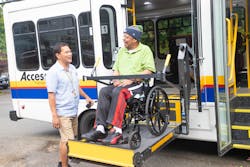A Service Turnaround: How King County Metro is making its paratransit service more than a solution
Two years ago, King County Metro’s (Metro) paratransit service, the Access Program, was audited by King County, which revealed the program had quite a bit of room for improvement. The audit outlined 17 recommendations to address things such as cost per trip, drop off and pick up times and the diversity of ridership.
Since that audit, Metro has taken steps to remedy the areas needing improvement. To start, the agency worked to create a new contract with a new service provider, MV Transportation (MV), that holds both entities accountable to a higher level of standards. The agency spent two years on this procurement process to ensure it will be positioned to continue addressing the recommendations. The transition to the new contract started November 1 and both agree the transition has been smooth thanks to the partnership they’ve developed.
MV Transportation as a partner
Metro wanted a contractor that would understand and demonstrate its values of sustainability, safety and equity, says Metro Mobility Division Director Christina O’Claire, adding how MV has been a “real partner” in the transition process.
“They have gone above and beyond in really coming to the table on how we can meet our contractor employee needs, how they have met our values around equity and making sure our customers are heard, and finally, they have really done a nice job in working collaboratively with the King County Metro employees,” O’Claire said.
MV credits the success of the partnership to a foundation of communication, collaboration and a shared vision, explains Mark Collins, president and COO of MV.
“During the recent transition, MV and King County teams worked tirelessly together throughout nights and weekends to ensure a smooth transition for our customers,” Collins said.
After reviewing the recommendations from the audit and engaging with stakeholders and customers, Metro developed a contract that would create accountability for the agency to go the extra mile in providing mobility services. To do this, the agency implemented a contract management plan that requires the agency to breakdown potential barriers to riders through community outreach, both of which were recommendations from the audit.
The new contract also addresses other audit recommendations, such as enforcing tighter drop off and pick up time frames, using a single contractor, fostering diversity in ridership and allowing for implementing flexible scheduling and payment options.
Prior to the contract starting, Collins says MV studied the audit to help make the service better and used it as a reference to know where to focus MV’s efforts.
“We studied the previous audit very carefully and, even before our contract started, began attending paratransit advisory committee meetings and gathering input from King County team members,” Collins said. “The audit report revealed what was important to customers and allowed us to build an operational plan that would deliver against those priorities and improve the service. We constantly refer to the audit report to ensure we stay on track with customer needs.”
Incentivizing to better service standards
The 2017 audit revealed almost half of Access riders who responded to a survey said they were dissatisfied with trip lengths and about half also said they avoided Access because of this, with 15 percent of trips being longer than the fixed-service route. To combat this, Metro included incentives and disincentives for drop off and pickup time frames in the new contract.
“We have a very strong disincentive program that tightens up our drop off and pick up windows and really looks at excessively long trips and holds people to a criteria that’s more aligned to what we see in the fixed-route service,” O’Claire said. “On the flip side, we have a very strong incentive program where, if the contractor works in coordination with us to provide that high level of service quality, and maybe looks at ways in which they can decrease their costs, we then share some of the cost savings associated with that.”
As of now, the agency utilizes technology to estimate trip times based on length of trip, time of day and day of the week, with plans to roll out technology allowing customers to compare trip lengths on Access versus on the fixed-route service.
Developing flexible and cost-effective scheduling options
Metro works to continuously provide innovative mobility solutions beyond the standard Access Program, and one of the ways it accomplishes this is through the Community Access Transportation program, which provides places like senior centers and religious institutions with a van to move groups of people who would otherwise use Access. The agency also subsidizes some of the service costs.
While this program is successful, Metro is looking into more alternative mobility solutions. Currently, the agency offers a taxi program, but the audit revealed only 10 percent of Access trips used a taxi compared to peer agencies at 62 percent usage.
Another driving factor to find more flexible scheduling options is the cost. The audit revealed 73 percent of Access trips were empty or had one person on board. Access was also the sixth most expensive paratransit service, costing $61 million to operate in 2016, out of the 40 largest U.S. paratransit programs and with an average cost per trip of $57 compared to the median cost of $40.
Flexible scheduling options would allow Metro to shift some of the costs and potentially lower the cost per trip.
“As we coordinate with the contractor on cost savings, we’re going to be working together on sharing those costs,” O’Claire said. “And I think that’s one of the best things about this contract, is that partnership that comes to the table. It really incentivizes us to work together to provide the best mobility at a lower cost.”
Collins explains MV will leverage its experience of working with diverse groups of paratransit customers who all require unique service models to provide more efficient service.
“We bring our experience with a variety of hybrid paratransit and on-demand service models, in addition to successful partner strategies with taxi companies and TNCs, for example, that can be applied to help the county meet their long-term objectives,” Collins said. “We are also applying advanced technology and data analytics to help drive additional reductions in cost-per-trip and improvements to service quality.”
Diversifying ridership and implementing community outreach
One of the bigger issues highlighted in the audit was the lack of diversity in ridership, specifically for riders where English isn’t the preferred language. The audit recommended more community outreach to provide education about the program and registration assistance.
To address this, the agency formed the new Access Paratransit Advisory Committee, comprised of a diverse group of Access riders, riders’ family members and community organizations that serve riders, that will advise Metro, the King County Executive and the King County Council on transit issues, policy and performance regarding the Access program.
“We’re in the review process of more than 70 applications and made extensive efforts to recruit individuals of varying races, ethnicities and languages to apply,” O’Claire said.
These efforts included providing the committee applications in six languages; engaging with 25 groups for people with disabilities on social media, which targeted more rural and underserved locations; in-person, one-on-one meetings with 30 different organizations; and email communications with an additional 200 organizations that work with seniors, people with disabilities, LGBTQ groups and ethnic community groups.
“We also sent out a customer letter in multiple languages to announce the contract transition to MV transportation,” O’Claire added.
To monitor the diversity of Access riders, Metro will ask for diversity information in its customer service surveys, which addresses the audit recommendation of proactive outreach to ensure more ridership diversity.
“As results are analyzed, we will monitor trends including customer demographics and compare against previous surveys that took place in 2016 and 2017,” O’Claire said.
In addition to rider surveys, the agency has also drafted an Equity Impact Review (EIR), another audit recommendation, that is in the final peer and management review process and is scheduled to be released by the end of 2019.
“The EIR includes options for increasing language access for our riders, providing translated materials along with assistance in completing applications and breaking down barriers to access services through community stakeholder engagement,” O’Claire said. “Once the data is received, we will endeavor to incorporate feedback into operational and technical upgrades surrounding language access.”
Providing a service that’s more than a solution
Metro has worked hard to build the Access program and sees it as more than just a solution, O’Claire says.
“We are doubling down on our fixed-route service to make sure that it’s accessible with not just our buses but looking to make sure the stops and stations are accessible,” O’Claire said. “And we’re also looking at all of our non-fixed route bus services to make sure it’s accessible for people beyond the ADA requirements.”
With addressing some of the audit’s recommendations and through strong community engagement, the Access Program can become more reliable and serve its constituents better.
“We are working side-by-side to make the service better,” Collins concluded.

Megan Perrero | Editor in Chief
Megan Perrero is a national award-winning B2B journalist and lover of all things transit. Currently, she is the Editor in Chief of Mass Transit magazine, where she develops and leads a multi-channel editorial strategy while reporting on the North American public transit industry.
Prior to her position with Mass Transit, Perrero was the senior communications and external relations specialist for the Shared-Use Mobility Center, where she was responsible for helping develop internal/external communications, plan the National Shared Mobility Summit and manage brand strategy and marketing campaigns.
Perrero serves as the board secretary for Latinos In Transit and is a member of the American Public Transportation Association Marketing and Communications Committee. She holds a bachelor’s degree in multimedia journalism with a concentration in magazine writing and a minor in public relations from Columbia College Chicago.



